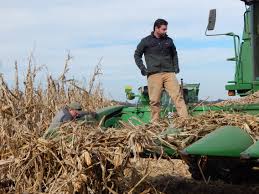Complying with farm regulations is essential for farmers to follow rules and guidelines set by authorities. It means farmers must do things the right way to ensure their farms are safe, environmentally friendly, and meet legal standards.
When we talk about complying with farm regulations, it involves adhering to laws that govern farming activities. These laws are designed to protect the environment, ensure the safety of food produced, and promote fair practices in the agricultural sector.
Farmers need to understand and follow regulations related to land use, water management, and chemical usage. This helps in preserving natural resources, preventing pollution, and maintaining a sustainable farming environment.
Compliance also extends to the welfare of animals on the farm. Farmers must adhere to standards that ensure proper care, housing, and handling of livestock. This not only meets ethical considerations but also contributes to the production of healthy and high-quality products.
Additionally, complying with farm regulations involves keeping accurate records of farming activities. This documentation is crucial for traceability and helps authorities monitor and verify that the farm is operating within legal boundaries.
By complying with farm regulations, farmers contribute to the overall safety of the food supply chain. It assures consumers that the products they consume are produced in a responsible and regulated manner, minimizing health risks and ensuring the quality of agricultural products.
However, complying with farm regulations is a responsibility that farmers carry to uphold the standards set by regulatory bodies. It is not just about following rules; it’s about sustaining the environment, ensuring animal welfare, and delivering safe and high-quality agricultural products to the community.
Read Also: Rabbit Feeds and Feeding Systems
How to Comply With Farm Regulations

Farming is important, and there are rules to make sure it’s done well. Following farm regulations is crucial for a smooth and safe farming journey. Here’s a simple guide on how to comply with these regulations.
1. Understand the Rules: The first step is to know what rules apply to your farm. Each place may have different rules, so check with local authorities or agriculture offices. This will help you understand what you need to do.
2. Keep Good Records: It’s like keeping a diary for your farm. Write down what you do, like when you plant or harvest. This helps you show you’re following the rules if someone asks.
3. Take Care of the Land: The soil is like the farm’s skin. Treat it well. Don’t use too many chemicals, and think about what’s good for the soil. This is not just good for the land; it’s also following regulations.
4. Animal Welfare Matters: If you have animals, treat them right. Give them enough space and good food. This is not just being kind; it’s also part of the rules for farming.
5. Use Safe Equipment: Machines help farmers a lot, but they can be dangerous. Follow the safety rules for your tools and machines. This keeps you safe and follows the regulations.
6. Protect Water Sources: Water is like gold on a farm. Don’t waste it, and be careful with what goes into it. Using too many chemicals can make the water bad, and that’s not following the rules.
7. Stay Updated: Rules can change. Keep an eye on any updates. This could be from the government or agriculture groups. Being informed helps you stay on the right track.
8. Get Help When Needed: If something is not clear, ask for help. This could be from other farmers, agriculture experts, or even your local agriculture office. It’s better to ask and be sure than to guess and make a mistake.
9. Be Honest: If something goes wrong, be honest about it. Mistakes happen. If you made a mistake, fix it and tell the right people. Being honest is part of following the rules.
10. Community Connection: Connect with other farmers in your area. They might have good advice or know something you don’t. It’s like having friends who understand your journey.
Following farm regulations may seem like a lot, but it’s like having a guide to help you on your farming adventure. It keeps you, your farm, and your community safe and happy. Happy farming!
Read Also: Nine (9) Nutrient Requirements of Rabbits
Advantages of Complying With Farm Regulations

Complying with farm regulations comes with several advantages that contribute to the overall well-being of the farm, the environment, and the community. Here are some key benefits:
1. Environmental Sustainability: Following regulations helps in managing the farm in an eco-friendly way. This means using fewer harmful chemicals, conserving water, and adopting practices that promote long-term sustainability.
2. Soil Health Improvement: Adhering to regulations often involves soil conservation practices. This not only maintains the fertility of the soil but also prevents erosion, ensuring that the land remains productive for future generations.
3. Animal Welfare and Health: Compliance with regulations ensures proper care for animals on the farm. This includes providing adequate space, appropriate nutrition, and maintaining a healthy living environment. Healthy animals are more productive and contribute to the overall success of the farm.
4. Access to Markets: Many markets, especially those dealing with organic or sustainably produced products, have specific requirements. Complying with farm regulations opens doors to these markets, allowing farmers to sell their products at premium prices.
5. Risk Mitigation: Regulations often guide farmers on best practices, reducing the risk of crop failure or livestock issues. Following these guidelines can protect the farm from unexpected challenges, ensuring a more stable and predictable operation.
6. Community Relations: Farms are often an integral part of the community. Complying with regulations demonstrates a commitment to responsible farming, fostering positive relationships with neighbors and local authorities. This support can be crucial in times of need.
7. Legal Compliance and Avoiding Fines: Non-compliance with regulations can lead to legal issues and fines. By following the rules, farmers avoid legal troubles and financial penalties, contributing to the overall financial stability of the farm.
8. Access to Government Support: In many places, governments provide support and subsidies to farmers who comply with regulations. This support may include financial assistance, technical guidance, or incentives for adopting sustainable practices.
9. Public Image Enhancement: Farms that comply with regulations often enjoy a better public image. Consumers are becoming more conscious about where their food comes from, and a positive image can lead to increased trust and support from the community.
10. Long-Term Viability: Sustainable farming practices, often encouraged by regulations, contribute to the long-term viability of the farm. By caring for the environment, managing resources wisely, and maintaining animal welfare, the farm is more likely to thrive over the years.
In essence, complying with farm regulations is not just about following rules; it’s a pathway to creating a farm that is environmentally sound, socially responsible, and economically viable in the long run.
Read Also: Methods of Monitoring Pollutants and Contaminants






